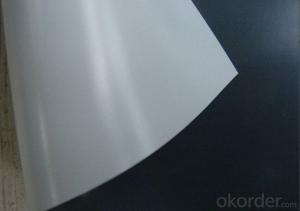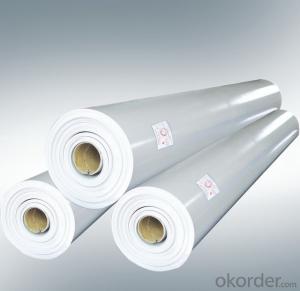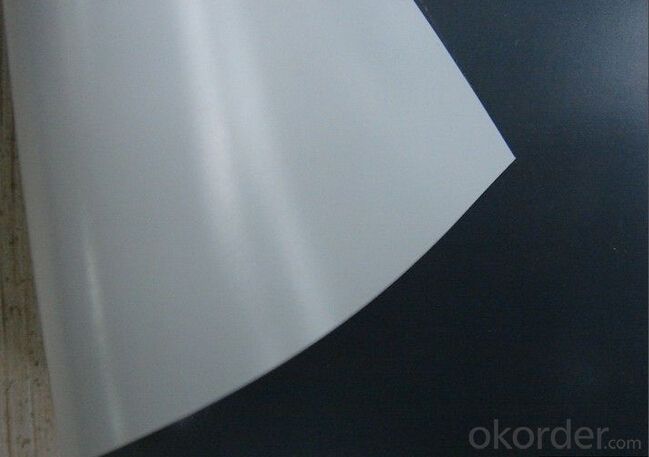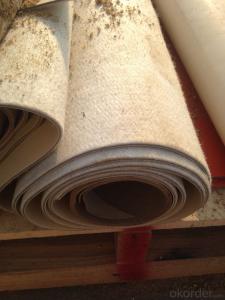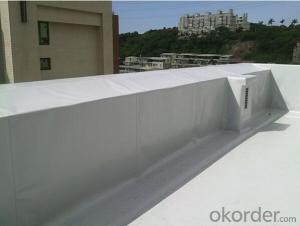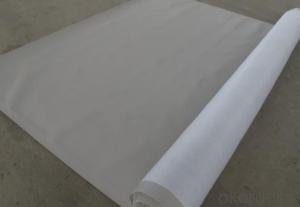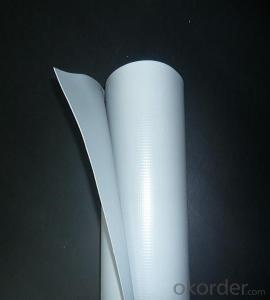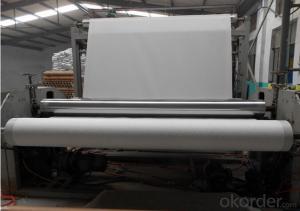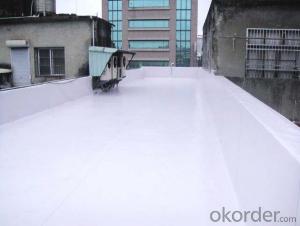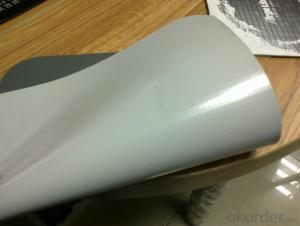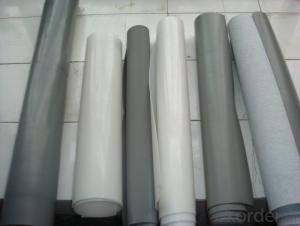Polyvinyl Chloride (PVC) Waterproofing Membrane Filter
- Loading Port:
- China main port
- Payment Terms:
- TT OR LC
- Min Order Qty:
- 5000 m²
- Supply Capability:
- 100000 m²/month
OKorder Service Pledge
OKorder Financial Service
You Might Also Like
The best quality PVC waterproof membrane in China
1. Features of PVC Waterproofing Membrane:
Excellent anti-aging property.
Puncture- resistant.
Welding construction,
High tensile strength, good elongation, good dimensional stability.
Good plasticity.
It has self-extinguishing from fire property.
Materials surface is smooth, fast color, stain resistance.
More wide, Wastage become less when being used.
2. Specification of PVC Waterproofing Membrane:
Item | Specification |
Length | 20m |
Width | 1.05m, 2.05m,2.1m |
Thickness | 0.8mm,1.0mm;1.2mm;1.5mm;2.0mm |
3. Type of PVC Waterproofing Membrane:
N1—Exposed PVC waterproof membrane.
(It is mainly used as details treatment for exposed roof waterproof project)
N2—Non-exposed PVC waterproof membrane.
(It is mainly used as details treatment for non-exposed roof waterproof project)
L1—Exposed PVC waterproof membrane with fabric.
(It is mainly used for exposed roof waterproof project)
L2—Non-exposed PVC waterproof membrane with fabric.
(It is mainly used for non-exposed roof waterproof project)
W1—Exposed reinforced PVC waterproof membrane .
(It is mainly used for steel structure roof exposed waterproof project)
W2—Exposed reinforced PVC waterproof membrane .
(It is mainly used for steel structure roof non-exposed waterproof project)
4. Use scope of PVC Waterproofing Membrane:
-All kinds of roof .eg steel structure roof, planted roof and so on.
-Underground engineering, such as building basement, subways, tunnels, air Raid shelter, etc.
-Other projects like artificial lake , dam, water reservoir,, grain storehouse, etc.
5. FAQ of PVC Waterproofing Membrane
a.Can we get some samples before place order?
Answer: We can send the free samples to you by freight collect.
b.How many years can your PVC membrane guarantee?
Answer: We will guarantee the quality for 5 years at least.
c.Which countries you ever export the product?
Answer: We export the PVC membrane to South Africa, Middle east and even European countries.
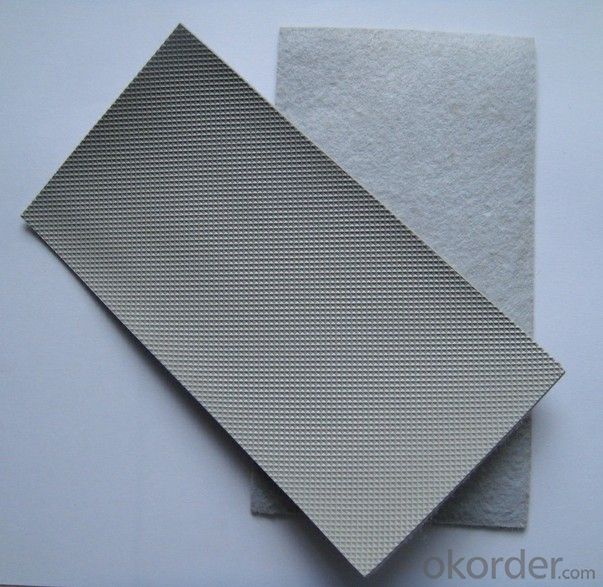
- Q: Can waterproofing membranes be painted over?
- Yes, waterproofing membranes can be painted over. However, it is important to ensure that the paint used is compatible with the membrane material. It is recommended to consult the manufacturer's guidelines or seek professional advice to ensure proper adhesion and longevity of the paint. Additionally, the surface should be clean and dry before applying the paint to ensure optimal results. Overall, painting over a waterproofing membrane can help enhance its appearance and provide additional protection against UV rays and other environmental factors.
- Q: Can a waterproofing membrane be used on rubber surfaces?
- Yes, a waterproofing membrane can be used on rubber surfaces. Waterproofing membranes are designed to create a barrier that prevents water from penetrating and damaging the underlying surface. Rubber surfaces, such as roofs, decks, or even rubber flooring, can benefit from the application of a waterproofing membrane to protect them from water damage. The membrane is typically applied as a liquid or a sheet, and it adheres to the rubber surface, forming a protective layer that prevents water from seeping through. This can help to extend the lifespan of the rubber surface and prevent issues such as leaks or decay caused by moisture. However, it is important to ensure that the waterproofing membrane is compatible with rubber and the specific type of rubber surface being treated, as some membranes may not adhere properly or may cause damage to certain types of rubber. It is always recommended to consult with a professional or the manufacturer of the waterproofing membrane to ensure proper application and compatibility.
- Q: Can a waterproofing membrane be used for shopping malls or commercial buildings?
- Yes, a waterproofing membrane can be used for shopping malls or commercial buildings. Waterproofing membranes are commonly used in construction to protect the structure from water damage. They are specifically designed to create a barrier against water infiltration, preventing leaks and moisture buildup. By applying a waterproofing membrane to the building's exterior, it helps to ensure the longevity and durability of the structure. Shopping malls and commercial buildings often have large surface areas that are exposed to different weather conditions, making them susceptible to water damage. Therefore, using a waterproofing membrane is an effective solution to protect these buildings and maintain their structural integrity.
- Q: Can a waterproofing membrane be used for historic preservation projects?
- Yes, a waterproofing membrane can be used for historic preservation projects. Waterproofing membranes are commonly used in construction to protect buildings from water damage, and they can be particularly beneficial in preserving historic structures. By preventing water infiltration, the membrane helps to safeguard the integrity of the building, protect against moisture-related deterioration, and extend the lifespan of the historic structure. However, it is important to ensure that the membrane chosen is compatible with the materials and construction techniques used in the historic building to avoid any adverse effects on its authenticity or structural stability.
- Q: Are waterproofing membranes resistant to chemicals?
- Yes, waterproofing membranes are generally resistant to chemicals. They are designed to provide a barrier against water, moisture, and various chemicals, making them highly effective in protecting surfaces against chemical damage.
- Q: Can a waterproofing membrane be used on tunnels with architectural features?
- Indeed, tunnels with architectural features can benefit from the application of a waterproofing membrane. Such membranes possess versatility, enabling their usage on different structures, including tunnels with architectural elements. Their primary purpose is to establish a protective barrier against water infiltration, consequently safeguarding the structure against moisture-related harm. Regardless of the tunnel's unique architectural components, such as curves, arches, or decorative embellishments, a tailored waterproofing membrane can be tailored and implemented to ensure optimal water resistance. Therefore, it is imperative to seek guidance from a proficient waterproofing specialist experienced in working with tunnels and architectural features. They will assist in determining the most suitable membrane system for the specific project prerequisites.
- Q: Does a waterproofing membrane add any additional insulation to a structure?
- No, a waterproofing membrane does not add any additional insulation to a structure. The primary purpose of a waterproofing membrane is to prevent water infiltration and protect the structure from moisture damage. It acts as a barrier against water penetration but does not provide any insulation value. Insulation, on the other hand, is designed to regulate heat flow and improve energy efficiency within a building. While both waterproofing and insulation are essential components in maintaining a well-functioning and energy-efficient structure, they serve different purposes and should be considered separately.
- Q: Are waterproofing membranes resistant to hydrochloric acid?
- No, waterproofing membranes are generally not resistant to hydrochloric acid.
- Q: Are waterproofing membranes suitable for exterior use?
- Waterproofing membranes are indeed suitable for use on the exterior. These specific membranes are designed to create a barrier against the infiltration of water and are commonly employed in a range of outdoor applications such as rooftops, balconies, and foundations. They are constructed from durable materials capable of withstanding exposure to harsh weather conditions, UV rays, and temperature fluctuations. By preventing water damage, moisture accumulation, and potential structural problems caused by water infiltration, these membranes offer valuable protection. Furthermore, they can be applied to a variety of surfaces including concrete, metal, and wood, making them highly versatile for different outdoor environments. In summary, waterproofing membranes present a reliable solution for safeguarding exterior surfaces from water damage and extending their lifespan.
- Q: Can a waterproofing membrane be used in planters or garden beds?
- Yes, a waterproofing membrane can be used in planters or garden beds to prevent water leakage and protect the surrounding areas. It helps to retain moisture in the soil and prevents water damage to the planter or garden bed structure.
Send your message to us
Polyvinyl Chloride (PVC) Waterproofing Membrane Filter
- Loading Port:
- China main port
- Payment Terms:
- TT OR LC
- Min Order Qty:
- 5000 m²
- Supply Capability:
- 100000 m²/month
OKorder Service Pledge
OKorder Financial Service
Similar products
Hot products
Hot Searches
Related keywords
